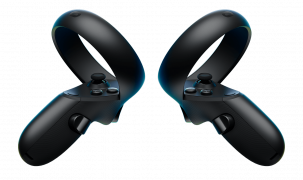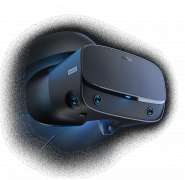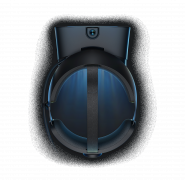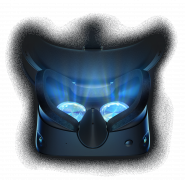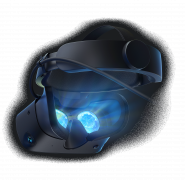Oculus Rift S
| Oculus Rift S | |
|---|---|
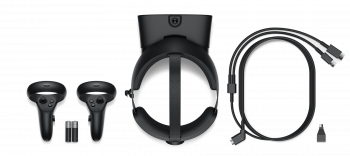
| |
| Basic Info | |
| VR/AR | Virtual Reality |
| Type | Head-mounted display |
| Subtype | Discrete HMD |
| Platform | Oculus Rift (Platform) |
| Developer | Oculus VR & Lenovo |
| Release Date | May 21, 2019 |
| Website | https://www.oculus.com/rift-s/ |
| Predecessor | Oculus Rift CV1 |
| Successor | Rift line discontinued |
| System | |
| Operating System | Windows 10 |
| Storage | |
| Display | |
| Display | LCD |
| Resolution | 1280×1440 per eye |
| Refresh Rate | 80Hz |
| Image | |
| Optics | |
| IPD Range | No mechanics |
| Tracking | |
| Tracking | 6DOF |
| Positional Tracking | Oculus Insight |
| Play Space | 9ft x 9ft |
| Audio | |
| Audio | strap audio |
| Connectivity | |
| Connectivity | Headset cable required |
| Device | |
| Sensors | 5 |
| Input | Oculus Touch |
| Size | 10.94 x 6.3 x 8.27 inches |
Contents
Introduction
The Oculus Rift S is a Discrete HMD built by Oculus VR in partnership with Lenovo to improve design and speed up manufacturing. The new design included a halo headband and fit wheel, room-scale tracking with no external sensors (which were required for the Rift), and a higher resolution compared to the Rift.[1]
The Rift S was released at the same time as Oculus Quest. Their similarities were plentiful[1]:
- launch price point ($399)
- inside-out tracking: Oculus Insight
- Oculus Touch controllers
- integrated audio system
- shared gaming library
While they came with many of the same features, they differed in one significant way: the Rift S required a PC connection, the Quest did not. The main thing to consider when purchasing Rift S was whether you had a computer that met the recommended specs for game play and/or you wanted to/could afford to purchase a gaming computer.[1]
Other differences between Rift S and Quest included: Passthrough support and sensors. The Rift S had an enhanced version of Passthrough - Passthrough+ which supported Asynchronous Spacewarp (ASW).[2] The Rift S also had a fifth sensor to support this enhanced Passthrough experience.[1]
Release and Pricing
Oculus Rift S was released on May 21, 2019 for $399. Two games were released exclusively for Rift S: Asgard's Wrath and Stormland.[3]
Hardware
Oculus Rift S came with a HMD, two Touch controllers + AA batteries, optical cable for connecting the headset to PC, and a video output adapter.
Unlike the Rift, the Rift S did not come with adjustable, IPD mechanics; you could adjust some of the settings through the software, but could not adjust the center of the lenses.[1][4]
PC Requirements
Recommended[5]
- Graphics: NVIDIA GTX 1060 / AMD Radeon RX 480 or greater, NVIDIA GTX 970 / AMD Radeon R9 290 or greater
- CPU: Intel i5-4590 / AMD Ryzen 5 1500X or greater
- Memory: 8GB+ RAM
- Video Outputs: DisplayPortTM 1.2 / Mini DisplayPort
- USB Ports: 1x USB 3.0 port
- OS: Windows 10
Setup Tutorial
- Download the VR software from Oculus.
- Connect your PC and Rift S headset using the provided DisplayPort cable.
- Browse the Rift library for games through your desktop, Oculus mobile app, or within virtual reality.
Input Devices
Oculus Touch controllers
Accessories
Prescription Lenses
You can purchase prescription-strength VirtuClear® Lens Inserts for your Oculus Rift S. They are 1.60 Hi Index Essilor lenses with anti-reflective coating meant to make your VR experience clearer. You can purchase through Frames Direct and will be asked for a valid prescription. The prescription range is SPH: 0 to -8.0 | CYL: 0 to -2.0.[7]
Apps
Store
You can purchase games from the Oculus Rift store on PC, mobile app, or from within the Store while wearing your headset. You can also play Oculus Quest games on Rift S.
Developer
Visit Oculus SDK
Images
History
- Release: May 21, 2019
- Discontinued: April 2021 in favor of Meta Quest 2, which can be connected to PC
- 2023: Rift S users will need to use Facebook account to sign in [8]
References
- ↑ 1.0 1.1 1.2 1.3 1.4 https://www.theverge.com/2019/3/20/18273152/oculus-rift-s-vr-headset-announced-pricing-release-date-features-gdc-2019
- ↑ https://www.oculus.com/blog/announcing-oculus-rift-s-our-new-pc-vr-headset-launching-spring-2019/
- ↑ https://www.theverge.com/2019/3/20/18273152/oculus-rift-s-vr-headset-announced-pricing-release-date-features-gdc-2019
- ↑ https://www.roadtovr.com/palmer-luckey-oculus-founder-rift-s-optimal-70-population-ipd/
- ↑ https://www.oculus.com/rift-s/
- ↑ https://www.oculus.com/setup/#rift-s-setup
- ↑ https://www.framesdirect.com/virtuclear-lens-inserts-for-oculus-rift-s.html
- ↑ https://www.theverge.com/2020/9/16/21422717/facebook-oculus-rift-s-discontinued-quest-2-vr-connect
